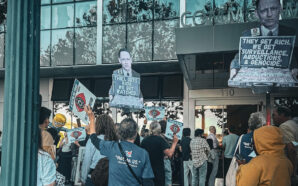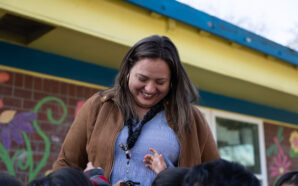Yue Stella Yu
CalMatters
Julián Castro was a student at Stanford University when California voters passed Proposition 187 — a ballot initiative to deny undocumented immigrants social and health services — in 1994.
“I remember the ads they ran with the grainy footage that said, ‘They keep coming,’” recalled the newly-named CEO of the Latino Community Foundation and former U.S. Secretary of Housing and Urban Development at a CalMatters Ideas Festival panel in Sacramento Thursday, June 6.
“It felt like a real affront to the Latino community.”
Widely seen as a turning point in California politics, the measure — endorsed by then-Republican-Gov. Pete Wilson and others — helped flip California blue.
Two decades later, could the rapidly growing number of young Latino voters again shake up the state’s political dynamics?
Nationwide, Latino voters are shifting rightward, and Democratic candidates’ margins of support among them have shrunk over the past three presidential elections.
Mike Madrid, a longtime GOP strategist and expert on Latino voting trends, said the change signals an “emergence” of new voters, partly driven by the rise of young Latino voters primarily concerned with the economy instead of immigration.
“The ethnic identity and the race anchor that immigration served for the past 30 years is no longer working for the fastest growing segment of the Latino electorate,” he said during the discussion, moderated by CalMatters senior editor Dave Lesher.
Castro, a Democrat, said it’s not a given, arguing younger voters may take issue with Republican stances on abortion and LGBTQ issues. But Democrats may have problems courting those voters, too: Both Castro and Madrid criticized President Joe Biden’s decision this week to close the southern border temporarily to asylum seekers — an action tried by former President Donald Trump.
“I think it’s a mistake,” Castro said, contending some Democrats thought the response to the border crisis could help them in the November election. “Do I get the politics of that? Sure. I also believe that they were bullied into a corner (to do) that, so now you are having to scramble a few months before an election to address it.”
The November election is another symptom of the political polarization that has taken shape for decades, according to former U.S. Rep. Doug Ose, a Sacramento Republican, and Democrat Leon Panetta, former U.S. Secretary of Defense and former director of the Central Intelligence Agency.
Voters must choose between Trump, the first former president in America to be convicted of felony crimes, and Biden, whose disapproval rate has steadily climbed since 2021, Panetta noted.
The presidential debates — the first of which is scheduled for June 27 — may be “chaotic” and “embarrassing,” Panetta and Ose agreed during an earlier discussion, moderated by CalMatters Editor-in-Chief Kristen Go.
“The problem today… isn’t about governing. It’s about stopping the other side,” Panetta said.
The solution, Ose said, is to elect “problem-solvers,” not “flame-throwers.” “It’s almost like we go to the people who are the loudest … as opposed to the most effective,” he said.





